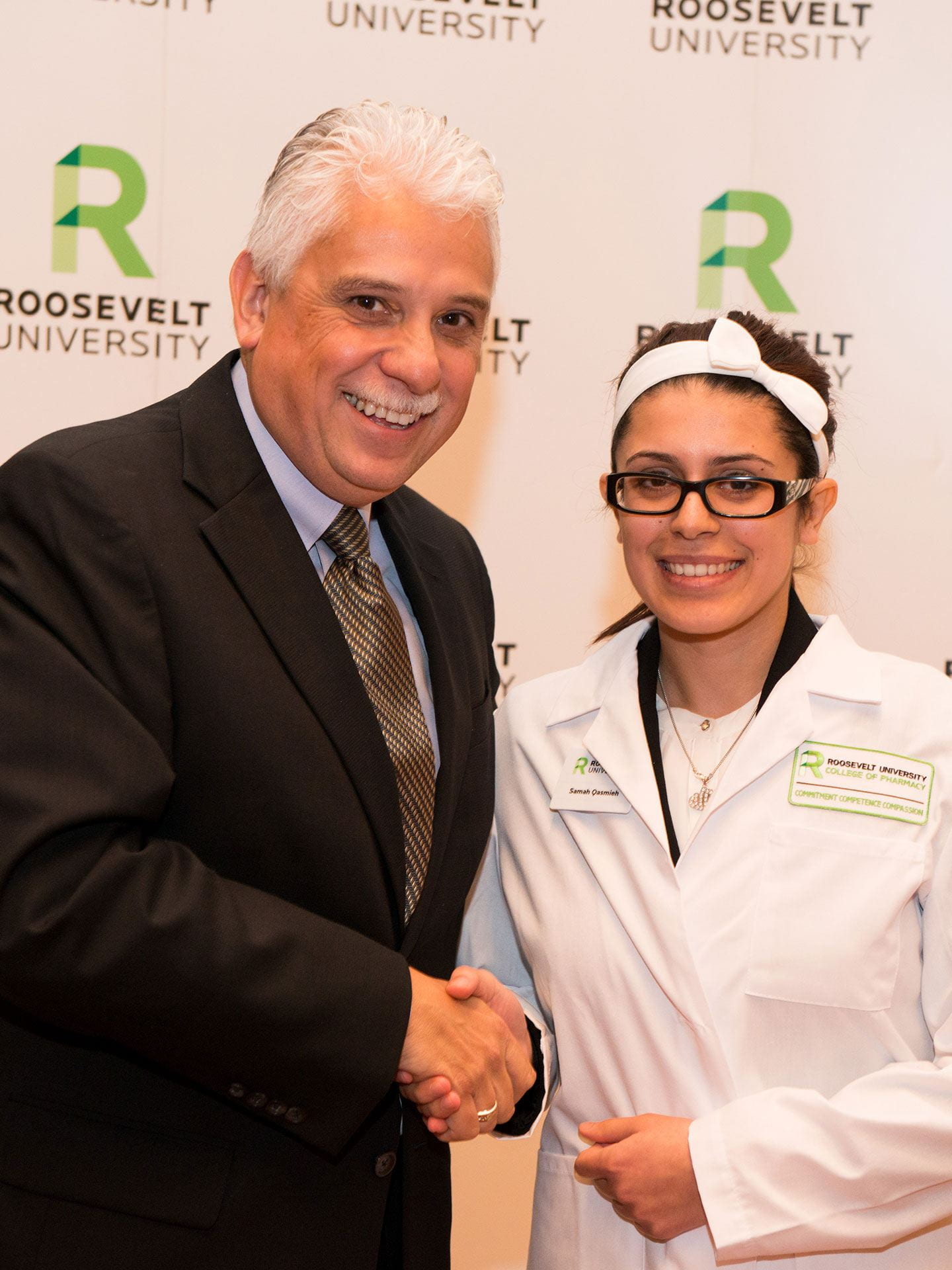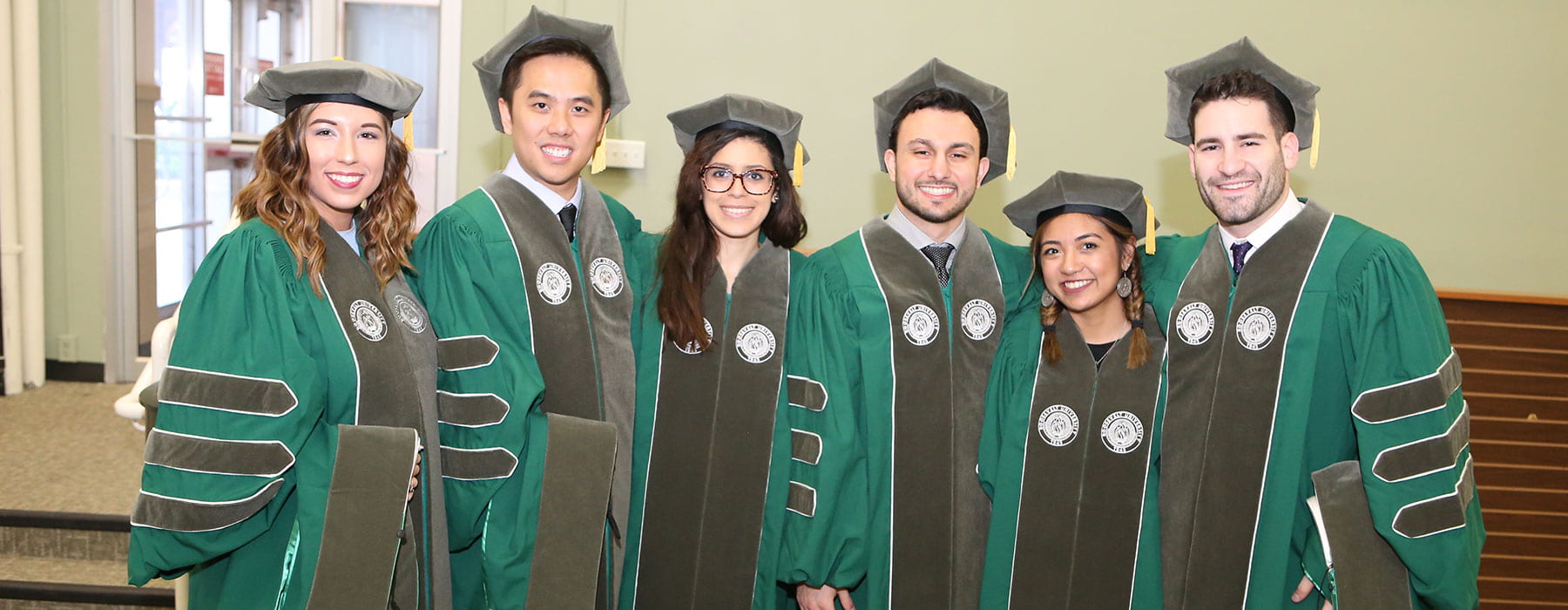Superbugs and Counterfeit Antibiotics
Samah Qasmieh (PharmD, ’17)by Katy Cesarotti
Samah Qasmieh (PharmD ’17) doesn’t like down time.
The 25-year-old College of Pharmacy graduate hasn’t taken a break since she finished high school, filling her summers with research, jobs and additional courses. Now, as an infectious diseases research fellow, Qasmieh joins the fight against antimicrobial resistance — one of today’s biggest public health challenges.
With an eye toward global health, Qasmieh’s pharmacy career has taken her from counterfeit antibiotics in the Dominican Republic to major research publications. The Roosevelt alumna travels between the University of Illinois at Chicago and an urban community hospital to work on five concurrent projects while completing her master’s degree in public health.
“When you’re doing things you love, you don’t really need to take a break,” she said.
Accelerating pharmacy education
Qasmieh’s relentless work ethic brought her to Roosevelt University’s three-year Doctor of Pharmacy program, the only one of its kind in Illinois. At Roosevelt, small class sizes allowed her to network with her peers and faculty, building lasting connections.

George MacKinnon, founding dean of the College of Pharmacy, and Qasmieh.
George MacKinnon, founding dean of the College of Pharmacy, and Qasmieh.
“There are so many nontraditional routes in pharmacy. My advice is to treat every rotation like it’s an interview, be professional and be open-minded.”
— Samah Qasmieh (PharmD, ’17)
Although Qasmieh had already worked in community pharmacy, she came into the program without expectations. “There are so many nontraditional routes in pharmacy,” Qasmieh said. “My advice is to treat every rotation like it’s an interview, be professional and be open-minded.”
In Dr. Abby Kahaleh’s class, Qasmieh and her cohort discussed how pharmacy professionals can promote and protect public health. The course planted the seeds of her future research interests.
“Samah was one of the highly ambitious, self-motivated, goal-oriented and engaging graduate students in our program,” said Kahaleh. “She served as a great role model for her peers.”
Solving public health challenges in the lab
Antibiotics like penicillin kill or slow the growth of certain bacteria, preventing the spread of disease. But bacteria evolve rapidly, and if even one resistant bacterium survives, it has a chance to multiply. Each time that patient takes antibiotics, the resistant bacteria grow in numbers until the illness can no longer be treated by that drug. Taking or misusing broad-spectrum antibiotics allows even healthy bacteria to develop resistance, which can spread to more dangerous strains.
Repeat this trend over millions of people, and you have today’s growing crisis of antimicrobial resistance.
In the United States, more than two million people contract an antibiotic-resistant infection each year, and 23,000 die. The main solution to date has been developing new antibiotics, but in the long term this could result in increasingly immune “superbugs” that are impossible to treat.
As an infectious diseases research fellow at UIC, Qasmieh is a passionate advocate for the responsible stewardship of antibiotics. She works closely with nurses, doctors and other researchers to develop better ways to use the antibiotics we already have.
Qasmieh is especially interested in biofilm infections, an under-researched arm of the resistance crisis. Biofilms are layers of microorganisms that form on other surfaces such as catheters or artificial joints (or teeth — biofilms can lead to gingivitis). Her research shows that biofilm infections could be up to 10 times more treatment-resistant than normal infections, an alarming trend.
Qasmieh is currently studying a new antifungal drug and developing dosing guidelines for patients on dialysis, who are especially vulnerable to life-threatening infections. Qasmieh says that physicians often resist using drugs without dosing guidelines, which means that patients with kidney failure lose an opportunity for treatment.
Although she doesn’t appear in the hospital room, Qasmieh’s work is the invisible connective tissue between doctors and better outcomes for their patients.

From left to right: Mackynzie Anderson, Andrew Tsang, Qasmieh, Yousef Turfe, Justine Viloria, and Brent Edelcup — all 2017 pharmacy graduates.
Tackling global health across borders
The Roosevelt alumna’s impact on public health resonates well beyond Chicago in her research on antibiotics in the Dominican Republic, which her colleagues believe might be counterfeit. Qasmieh tests samples region by region using a technique she learned in Dr. Ravi Kiran Panakanti’s summer research lab at Roosevelt.
“Samah was extremely hardworking, diligent and quick to grasp concepts,” said Panakanti. “She keeps herself abreast of the latest developments and has a flair for research.”
This winter, Qasmieh hopes to travel to Gaza with an Arabic-speaking team of doctors, nurses and clinical psychologists. Partnering with mental health professionals, she would help vaccinate children growing up in the war zone.
“I definitely want to give back to the community,” Qasmieh said. “We want to provide overall better health to these people who don’t have the resources that we do here in the States.”
“I definitely want to give back to the community. We want to provide overall better health to these people who don’t have the resources that we do here in the States.”
— Samah Qasmieh
(PharmD ’17)
Getting out in the community
In her life as a researcher, Qasmieh is rarely holed up in her laboratory. She constantly networks with doctors and nurses, translating pharmaceutical discoveries into real results for patients.
At Saint Anthony Hospital, she’s developing a new protocol for interviewing patients about penicillin allergies, so doctors can avoid broad-spectrum antibiotics with harsher side effects. She’s also working quickly on protocols for the hospital’s new pediatric unit.
“Although it’s rewarding to have your successes in the lab, I want them to be tangible, too,” Qasmieh said. “I want to go out in the community and actually implement protocols and see what I’m doing make a positive difference. And I can only do that if I work with other people.”
“Although it’s rewarding to have your successes in the lab, I want them to be tangible, too.”
— Samah Qasmieh (PharmD, ’17)
Mentoring the next generation
Going forward, Qasmieh isn’t ruling anything out.
Like her mentors at Roosevelt, Qasmieh hopes to remain in academia, where she can continue her research and support the next generation of pharmacists.
“I love being a mentor to others,” she said. “I’ve precepted so many students throughout residency and fellowship. I want to pass on the good.”
